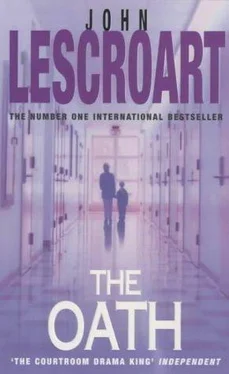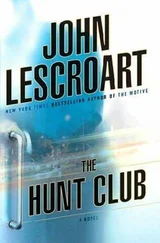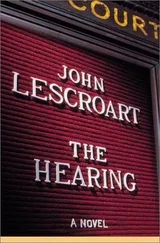4:45.
Turning around, he looked up at the large clock on the kitchen wall. Same time. Finally, he thought to consult his watch, and got the third corroboration. It was quarter to five on Thursday morning and he was wide awake, dressed up and nowhere to go. And for no particular reason other than that somebody had obviously reset his alarm. When he found out which kid it had been, there would be hell to pay. He had half a mind to wake both kids up now, identify the culprit, break out the thumb screws.
But so much for his run of good luck. And he still had to wait for his damn coffee to brew. With nothing to do now except kill time, he angrily opened the paper and threw it down on the dining room table. Sitting down, he noticed that yep, it was still dark.
At least now he knew why.
Then he noticed the headline: "HMO Chief's Death Called Murder." With the subhead about potassium, he had all he needed to know, although he read the whole article. His new client appeared only once, as the attending staff physician at the ICU, but once was enough. Hardy started to worry.
The accompanying article on Markham 's family ratcheted his concern up even further. The paper characterized the event in ambiguous terms, hinting that the evidence seemed to implicate the wife in murder/suicide-another senseless American tragedy, the reason for which might never be known. But in his guts, Hardy felt that Markham 's death being ruled a murder made any conclusion about the how and why of the family's slaughter decidedly premature.
When he finished the second article, he sat in contemplation for several minutes. Then he got up and poured a cup of coffee, came back to the table, and read Jeff Elliot's column.
CityTalk
by Jeffrey Elliot
AS MEDICAL DIRECTOR OF PARNASSUS HEALTH, the beleaguered HMO that is under contract to insure the city's employees, Dr. Malachi Ross has been under a lot of pressure over the past months. From his original and eventually overturned refusal to allow prescriptions of Viagra as a covered expense to the much more serious Baby Emily incident at Portola Hospital, his business decisions have come under almost continuous fire from any number of consumer, public interest and watch-keeping organizations, including this newspaper. Now, in the wake of the death on Tuesday of Parnassus CEO Tim Markham, and Ross' election to that position by the Parnassus board, it looks as though his real troubles may have only just begun. (As this column goes to press, the Chronicle has learned that Mr. Markham's death has been called a murder by police investigators.)
Early last week, as one of his last official acts, Mr. Markham presented the city with a bill in excess of $13 million for previously undiscovered outpatient care at various neighborhood clinics. A source at the DA's office describes the paperwork on these billings as "at the least, irregular," and quite possibly "fraudulent." At the same time, Parnassus has applied for a rate increase of $23 per month for every covered city employee, which if approved represents an extra hit of nearly $700,000 a month to the city's budget.
At the same time, the woes of Parnassus and of its flagship hospital, Portola, continue to grow. In an interview on Tuesday evening, Dr. Ross admitted that the medical group is mired in a deep cash crisis, although he characterized the nonpayment of some Parnassus doctors as a voluntary loan program. Another source-a doctor within the group-had a slightly different take: "Sure," he said. "It's voluntary. You volunteer to loan your salary back to the group, or you're fired."
Nevertheless, Ross remained confident that Parnassus can weather this crisis. "The goal is maximum wellness for the most people," he said. When asked if he saw any conflict between the group's business interests and the needs of its patients, Ross replied, "The company needs to sustain itself so it can continue doing its work."
Because it conducts business with the city, Parnassus ' finances are a matter of public record. Last year, the average staff physician with Parnassus had a salary of $98,000. The average executive board member, of which there are thirty, sustained himself to the tune of nearly $350,000 including bonuses, per person, for a total expense to the company of approximately $10.5 million. As CEO, the late Mr. Markham had the highest salary in the group-$1.4 million, and Dr. Ross was next, drawing $1.2 million in salary and performance bonuses.
Imagine how well he'd do if Parnassus was not going bankrupt.
***
Glitsky was in the elevator, and when the door opened on the fourth floor, he was looking at Dismas Hardy, who said, "I was just at your office. You weren't there."
"You're kidding." Glitsky stepped out into the lobby. "When?"
"Just now."
"I wasn't in my office?"
"No sign of you."
"One of the things I've always admired about you is that keen eye for detail."
The two men fell into step together, heading back toward the homicide detail. "What's another one?" Hardy asked.
"Another what?"
"Thing you've always admired about me. One implies there are more."
Glitsky glanced over at him, walked a few steps, shook his head. "On second thought, that's the only one. Keen eye for detail."
At homicide, inside Glitsky's office, Hardy took one of the fold-up chairs in front of the desk. He looked around critically. "You could use some art in here," he said. "It's a little depressing."
"I like it depressing," Glitsky said. "It keeps meetings short. Speaking of which"-he pointed at his overflowing in-box-"that is today's workload and I'm behind already. What can I do for you?"
"My keen eye for detail tells me that you're not in much of a sociable mood this morning, so I'll get right to it. I take it Bracco is one of your car police."
"That would be accurate." He reached for his in-box. "Well, drop by anytime. It's been a real pleasure."
"I've got one more. What do you know about Tim Markham?"
Glitsky stopped fiddling with paper, cocked his head to one side, and frowned. "Who are you representing?"
"Eric Kensing."
"Swell. When did that happen?"
"Recently."
Glitsky sat forward in his chair and brushed a hand over his scar. "As I recall, the last time I talked to you about a case at this stage, I lost my job for a couple of weeks."
"True. But it was the right thing to do." A year before, Glitsky had been put on administrative leave after he'd shown Hardy a videotape of his client's questionable confession before the DA's office had cleared it for discovery purposes. "And you know what Davy Crockett always said? 'Be sure you're right, then go ahead.'"
"I always thought that was the stupidest thing I'd ever heard. The jails are full of people who think like old Davy. Genghis Khan, I believe, had the same motto."
"And a fine leader he was. I've just got a couple of quick questions. They won't get you fired. Promise."
"Ask one and let me decide. And quickly, if that's possible, though history argues that it isn't."
"Is Kensing in trouble?"
Glitsky nodded in appreciation. "That was pretty good for you." A shrug. "Well, no matter where we stand on charging Markham's murder, I'm betting your client is one guy who's definitely going to need a lawyer on the malpractice side alone. Aside from that…" Glitsky threw a glance over to the door-closed. He came back to Hardy. "I suppose he told you he's got a motive." He paused, then gave it up. "He was also the last person with the family."
"You mean Markham's family? The paper implied that it was the distraught wife."
"Yeah. I read it." Glitsky sat back. "I think you've had your question."
"You think it wasn't the wife? And if it wasn't, it was the same person who did the husband?"
Читать дальше












